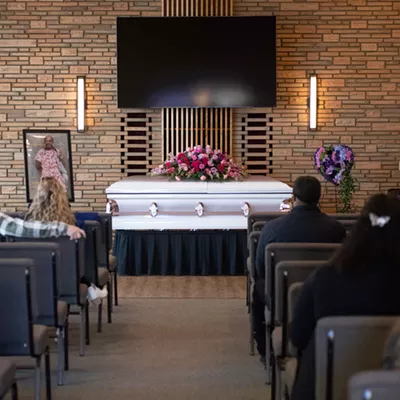Wednesday, August 27, 2014
Inlander reporter Jacob Jones wins Washington Mental Health Reporting Award
We’re pleased to share that Inlander reporter Jacob Jones has won the 2014 Washington Mental Health Reporting Award for his stories in our ongoing State of Mind series about the local mental health care system.
In particular, the award recognizes his stories “Locked Away” and “Changing of the Guard,” delving into how Spokane’s criminal justice system handles people with mental illness. The first piece tells the story of Amanda Cook, who took her own life in the Spokane County jail while awaiting a mental health evaluation, and the ongoing struggle of the jail to meet the needs of inmates with mental illness.
From that story:
Within the black-mirrored glass monolith of the Spokane County Jail, the regional criminal justice system bears a responsibility it was never built to shoulder. In the wake of deinstitutionalization in the 1970s, local jail facilities have become the modern asylums, granted dwindling resources to meet the growing demands of a nuanced population of inmates with diverse treatment needs and sensitivities.
The county jails in Chicago, Los Angeles and New York now stand as the three largest mental health facilities in the nation, together treating more than two and a half times the combined capacity of the country's top three mental health hospitals.
Spokane County Sheriff Ozzie Knezovich argues that federal and state lawmakers have forced mental health care onto underfunded local governments. With state and community facilities cutting programs, jails across the country have evolved into warehouses for locking up large numbers of the mentally ill. A 2012 survey of 20,000 jail inmates found 17 percent met the criteria for serious mental illness.
"The criminal justice system," Knezovich says, "is not really the proper place for mental health treatment. ... The jail is [already] way beyond its limits."
The second story follows law enforcement’s work to implement “Crisis Intervention Team” (CIT) training, partnering police with mental health care providers to help them handle encounters with people with mental illness. The training was a requirement of the city’s settlement with the family of Otto Zehm, a 36-year-old schizophrenic janitor who died in police custody in 2006, and remains important as recent high-profile police uses of force have involved citizens with mental health issues.
“Jones’ vivid storytelling helps readers understand the impact that mental illnesses can have on the family and friends of those in need of treatment, many of whom are also at high risk for suicide,” the judges wrote. “His articles document the kinds of challenges facing criminal-justice systems that are increasingly overburdened by people who have a mental illness.”
The award is selected by a panel of judges drawn from media and mental health organizations, the University of Washington’s journalism faculty and people who have personal experiences with suicide risk or loss. It comes with a $500 prize and will be awarded at a ceremony in Seattle Sept 30.
Inlander contributor Leah Sottile won the award in 2012 for “The People Left Behind,” her story about a 13-year-old’s death by suicide and efforts to prevent suicide in the region.
Tags: mental health , jacob jones , state of mind , award , mental health reporting award , News , Image


















